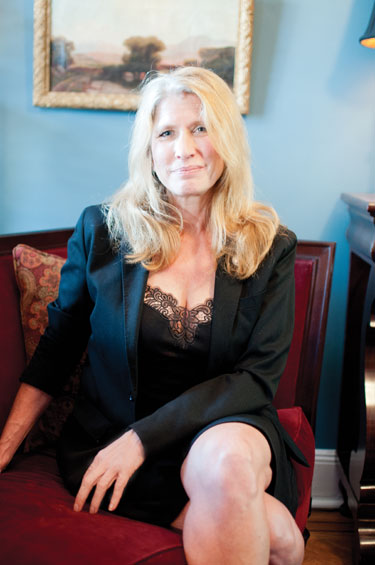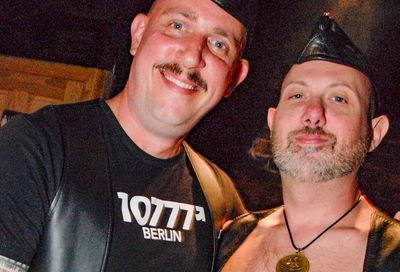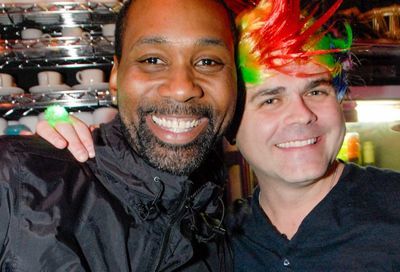Sexual Union
With a new book, Melinda Chateauvert aims to bring sex work out of the shadows and into the light of respectability

MindyChateauvert
(Photo by Todd Franson)
MW: Did your activist bent develop from your time in San Francisco, as it seems to do for so many who go there?
CHATEAUVERT: No, it developed in Iowa, when I was a kid. Seriously, Iowa City as a university town was all caught up in the anti-war movement. So I grew up in an environment in which there were protests and sit-ins and demonstrations against Dow Chemical, and demonstrations against napalm and all the rest of it. That’s the kind of place that I grew up. When I came back to Iowa City to go to college, I became involved in things like the Rape Crisis Center — I was an emergency counselor for that. I did work as a programmer for the Women’s Resource and Action Center, the women’s center on campus. I was a women’s studies major. I got involved in student government, did the whole thing. So student politics, campus politics, were really some of my first real feet-getting-wet on my own activism, both service work and policy work. I did one of the first studies on sexual harassment of students while I was at the University of Iowa. That was in 1981.
MW: When did you come out?
CHATEAUVERT: The best way to put it is that I discovered what I could be in San Francisco. I “came out” in my first year or so of being back in Iowa. Iowa City also has a huge gay culture and a huge lesbian community. We had the women’s coffee house, which is an all-lesbian coffee house. I was on the women’s softball team. We did escorts to the clinic. That’s what, to me, being an undergrad meant.
MW: Speaking to the progressive culture of your upbringing, Iowa was one of the first states to have marriage equality.
CHATEAUVERT: Let’s rephrase that, let’s make it even more important — Iowa City was one of the first seven municipalities in the nation to outlaw employment discrimination on the basis of sexual orientation. That was in the early 1980s.
MW: I assume that didn’t include transgender.
CHATEAUVERT: Not necessarily. Although I do know that there were transgender people who did benefit individually from that law.
MW: Are you in a relationship?
CHATEAUVERT: I have a very long-term relationship, and, no, Mary and I will never get married.
MW: Because you’re against the concept of marriage?
CHATEAUVERT: I am still enough of a feminist to believe that marriage is a patriarchal institution that I do not want to support. We are both of that persuasion.
MW: Speaking of feminism, on a personal level I found it particularly fascinating when you write about the feminist movement and its generally anti-porn advocacy. When I was in college taking women’s studies classes, I always came up short in trying to defend pornography because my experience with it is very different as a gay man. I mean, maybe women in straight porn, maybe they are victims, but it just seemed too easy to look at it that way. And that’s sort of what you express. But that was 20 years ago. Has this changed at all in the decades since?
CHATEAUVERT: Twenty years ago, I was still very much involved in the women’s studies fora/movement. I did a master’s degree in women’s studies and public policy at GW. That’s how I ended up in D.C. in the first place. It was the middle of the sex wars, the so-called “campus sex wars.”
It’s important to remember two things: One is that the porn that people like Andrea Dworkin and Catharine MacKinnon, and all of the other ’80s folks if you will, were criticizing — the heterosexual porn that they were criticizing, was often, yes, really horrible! Actually, if somebody wanted to challenge it on its artistic merits, or on its ability to move women, it would lose. That’s important to remember. It wasn’t that the people who were defending porn thought that the porn that was available was fabulous. There were some really very strong critiques about the male-centered gaze and all that. The problem was who controlled it, perhaps. But by censoring it you create other problems. For example, the Supreme Court of Canada issued a ruling called Butler in 1992, which took that Catharine MacKinnon argument — that porn was harmful to women. And notice how sexist, also, this is. It’s only about women. It’s very black and white in that way. When Butler became the rule in Canada, the first two types of people that found themselves being criminalized for distributing “porn,” was one, a gay men’s group that was making safer-sex videos for gay men in the sex industry; and, two, the Boston-based radical sex lesbian group that was sending their magazine to Canada, and it was stopped from going over the border as being harmful to women. Even though this was an all-women production of pornography. Because the way the law worked is that the people who get criminalized are usually the people at the lowest margin.
MW: You can say that about a lot of laws and legislation.
CHATEAUVERT: [Laughs.] Yeah, exactly. Here’s the other new thing that’s coming on: Now the feminists who are against porn have picked up the early 1990s Christian sex addict/porn addict language — which no accredited sexologist or psychiatrist actually believes exist. But they have created this myth they call “porn addiction.” There are feminist groups against pornography who are likening it exactly to drug addiction. “This is your brain on drugs.” “This is your brain on porn.” It’s the exact same language. I find this to be particularly scary. But it’s also very informative about how these languages and these themes continue to get replayed, and to get reconfigured, so that they need some sort of new moral panic/sex panic, to outrage people.
MW: In your book, you call the view of feminists who are anti-porn “paternalistic.”
CHATEAUVERT: And that paternalism is very much a part of a lot of feminist action, or feminist calls for using the prison system, or using laws to punish people. It’s a “Feminists Know Best”/”Fathers Know Best” language.
MW: Returning to your personal life, I understand you’re now in New Orleans. Do you live there full time now?
CHATEAUVERT: No, I’m half-time. We came down because we wanted to avoid the snow this winter.
MW: You’ve become a snowbird?
CHATEAUVERT: I guess I am a flyaway snowbird. But we’ve actually had a house here long before Katrina. And so this has been a way of now being able to be here longer and changing our schedule so that we can be two places during a given year.
MW: Do you teach in D.C.?
CHATEAUVERT: No, my teaching is now going to be at the University of Pennsylvania.
MW: When do you get back to D.C.?
CHATEAUVERT: I’ll be back in town on a regular basis beginning in May. After I go to Saints and Sinners Literary Festival down here in New Orleans.
MW: When you’re in D.C., you’ll be doing research and writing?
CHATEAUVERT: Yeah, I’ve got a research project right now that I’m not really ready to talk about, but it does continue looking at some of these same issues, specifically looking at people who work in the legal sex industry.
MW: And D.C. is also where you have your social outlet with the leather community?
CHATEAUVERT: Yeah. For me my home bar is the DC Eagle. It’s not anyplace else. It was never the Phase, it was never Hung Jury. It was never any lesbian bars. It was the Eagle. And still is the Eagle, even in exile.
Melinda Chateauvert will read from and sign copies of her new book Sex Workers Unite! on Wednesday, March 12, at 7:30 p.m., at Busboys & Poets, 1025 5th St. NW. Call 202-789-2227 or visit sexworkersunite.com and busboysandpoets.com.
Support Metro Weekly’s Journalism
These are challenging times for news organizations. And yet it’s crucial we stay active and provide vital resources and information to both our local readers and the world. So won’t you please take a moment and consider supporting Metro Weekly with a membership? For as little as $5 a month, you can help ensure Metro Weekly magazine and MetroWeekly.com remain free, viable resources as we provide the best, most diverse, culturally-resonant LGBTQ coverage in both the D.C. region and around the world. Memberships come with exclusive perks and discounts, your own personal digital delivery of each week’s magazine (and an archive), access to our Member's Lounge when it launches this fall, and exclusive members-only items like Metro Weekly Membership Mugs and Tote Bags! Check out all our membership levels here and please join us today!



















